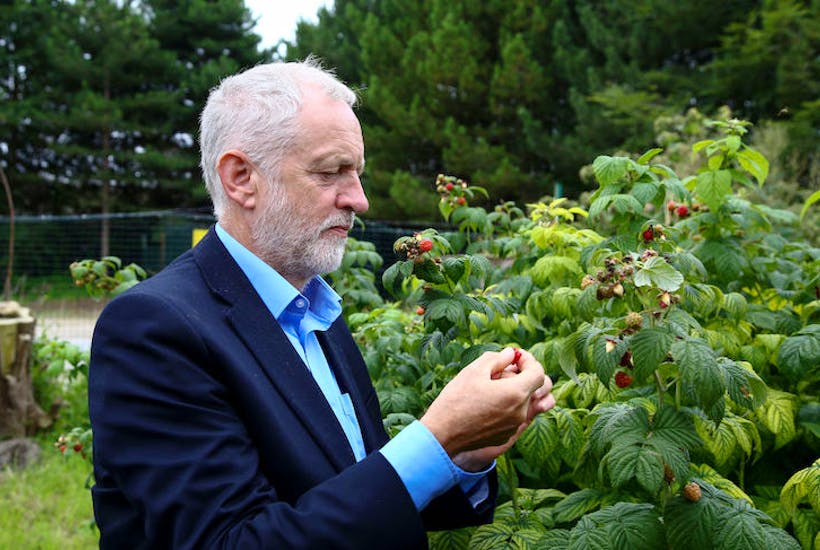News that Islington’s yummy mummies are up in arms about a proposed Ocado refuelling centre near a local primary school has caused much mirth and merriment in the media. How hypocritical, that the very people who use Ocado deliveries most – when not driving their 4WDs with Greenpeace bumper stickers to the Nags Head branch of Waitrose – should be jumping up and down in their ethically sourced hemp sandals at the possibility their little darlings might have to inhale the same fumes as common folk in Barnsley and Brixton. Few of the contributions have taken note of the fact that air pollution around Yerbury, where the Ocado depot is being built, is appalling and a great leveller – lung disease doesn’t discern between those who own or rent their homes.
The Ocado controversy is really an extension of an ill-informed debate around Brexit, Corbyn and the supposed ‘soul’ of the Labour party. Islington, the argument goes, is the spiritual home of Corbynism: middle class, ultra-woke, out of touch with the harsh realities of life as experienced by people in less fortunate postcodes. And, while there’s some truth in the stereotype – it’s impossible to do the school run without bumping into Ed Miliband, Keir Starmer or Jezza himself – there’s more to Islington than Remain-voting, self-flagellating, prole-loathing yuppies (as I still call them).
As someone who has lived in and around Islington since 1985, and with two children who attend schools nearby, I know that Islington is a more complex, divided and dangerous place than usually depicted. As I noted as long ago as 1997, when I watched Labour march to victory in the general election at a friend’s place on the Marquess Estate, politics has been turned on its head in Islington. Vote Labour and Remain posters seem to plaster every Georgian and Victorian terrace, whereas on many estates you’re more likely to see Leave posters – along with the England flags local MP Emily Thornberry finds so hilarious.
Even today, despite (or because of) decades of local Labour rule, Islington remains one of the poorest boroughs in Britain, with pockets of poverty as deprived as anywhere in Liverpool or Glasgow. Knife crime remains a major problem; just last week, a delivery driver was stabbed to death outside our former home in Finsbury Park. Of course much of the knife crime is between gangs of youths, and once you reach a certain age it is entirely possible to cross into another postcode without being ‘stabbed up’. However, violent crime, robbery and burglary are all a part of inner city life, and despite being media shorthand for champagne socialism, Islington is no different to any other part of London. I’ve witnessed gang fights, seen stabbings and heard a man being shot dead by police, but I’ve also enjoyed living in a busy, diverse part of London with fantastic pubs, restaurants and cultural institutions.
When our children were younger, I noticed that outside the primary school there seemed to be a cultural chasm: between the film directors and BBC producers at one side of the playground, and long-term locals on the other. Although it’s a generalisation, their clothes, their politics, even their ages (working-class mums tended to be younger) all seemed pronounced; my wife and I occupied the strange middle ground, our accents, dress and attitude marking us as one thing, our education and occupations another.
Since the general election much has been made of the divides that remain – between North and South, old and young, and between races. In fact, the biggest divides are cultural. Not just between Leave and Remain, but between Radio 4 and 5 Live, between those who find Marcus Brigstocke amusing and those who don’t, those who think Meghan’s the victim of appalling racism and those who think she’s a spoilt brat, between Guardian readers – and everyone else. The Labour party has probably reached the point of no return – there’s simply no reconciling its woke, self-identifying, pro-Remain, anti-English leadership with the millions of ordinary people who would once have been its natural supporters. People who are decent, give to charity, go on holiday rather than travel, have big tellies and write in to Radio 2; like Ant and Dec; who aren’t racist but think foreigners should make a bit of an effort.
The Conservatives probably faced the same difficulty when revolutionary capitalist Margaret Thatcher threw a live hand grenade into the smoking lounge of the Old Boys’ Club. Today’s Conservatives are more likely than ever to be women, Asian, or gay; they are also as likely to come from what used to be called a working-class background – citizens of ‘somewhere’, as David Goodhart put it, rather than ‘anywhere’. When I first moved to London, and people asked me where I was from, I’d say ‘Islington’ if I wished to sound posh; ‘Holloway’ if I wanted to sound streetwise. The fact is, they’re the same place; it’s just the only time the residents of these two cities ever meet is at Archway Swimming Pool, and even there you can usually tell which tribe they belong to by their accent, tattoos and BMI.
(If that last sentence shocked you, by the way: you’re middle class. Just so you know.)






Comments